Should parents pay to bin used nappies?
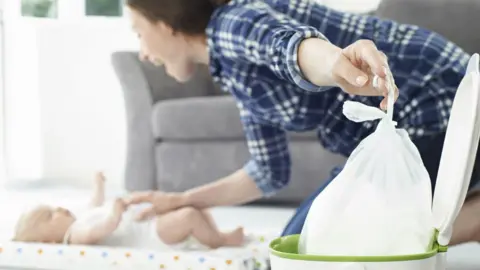 Getty Images
Getty ImagesParents have raised a stink over "ridiculous" plans by some councils in England and Wales to charge them to take away nappies on top of their household waste.
Among the gripes is that bin collections are getting less frequent and cause a smelly pile-up. So what options do parents have?

What are nappy bins and how much are they?
Nappy bins are not always free - or available - across the UK.
Dorset, for example, recently introduced a £13 charge for an annual supply of nappy sacks, which are available for children up to age three.
Councils in Bournemouth and Poole let households of five people or more buy an extra bin for £43.
Kalpana Fitzpatrick, a journalist from London, thinks the charges are "absolutely ridiculous". She tweeted: "Why not introduce a tax for dog owners where councils have to have poop bins instead of introducing a nappy tax?"
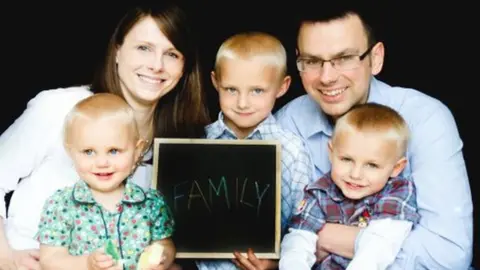 Wendy Richards
Wendy RichardsAbout eight million nappies are thrown away every day in the UK, according to local authorities, with one baby using enough disposable nappies to fill 40 black sacks a year.
Mother-of-three Wendy Richards, who uses reusable cloth nappies, says a nappy bin charge is "understandable".
"The average baby goes through a huge amount of nappies," she says. "People don't realise how much landfill waste that is. Someone's got to pay for it."

Do bin collections create problems for young families?
Young parents have complained of a "poo problem" as the time between bin collections has increased, with some areas in the UK having to wait a whole month.
Abi Jones, a PA from Essex who blogs about being mother to two-year-old Alfie, says her family has "definitely found it more difficult" since their local council switched to fortnightly bin collections.
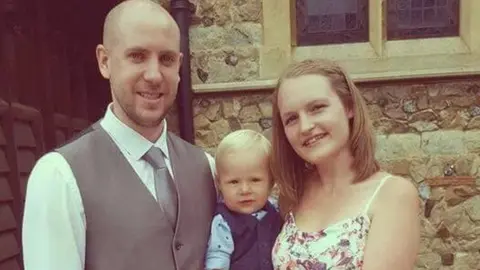 Abi Jones
Abi Jones"Had Alfie been a newborn - and getting through the amount of disposals newborns do - we would have had to make extra trips to the local refuse centre," she says.
Anglesey council, which has three-weekly collections, offers parents an extra nappy bin collection. But once a toddler reaches age three the service stops, as by this age the council says most children are potty trained.
In Bridgend, the council introduced purple collection bags for nappies and other items, such as incontinence pads, in June after it said smaller households could throw away up to two rubbish bags a fortnight.
Councils say the move from weekly rubbish collections saves money and encourages people to recycle more. Local authorities have a target to recycle at least half of all waste by 2020, to meet the European Union's Waste Framework Directive.

What about disabled children?
Councils often make exceptions for large families, disabled children and for people with medical conditions if they need more space for waste.
But Carly Dashwood, responding to the charges on Facebook, said they were "disgusting" if parents with disabled children had to pay.
She writes: "I have a disabled child and he is in nappies. This is very unfair on people that don't have a choice in the matter."

What if you don't want a nappy bin?
It is not compulsory to use nappy bins or sacks, but councils can fine families if their household waste gets out of control.
If a bin is so full it is deemed littering, councils can issue fixed penalty notices of about £60 to £80 - or slightly less for early payment - under the Environmental Protection Act.
If the offence is classed as fly-tipping, fines are between £150 and £400.
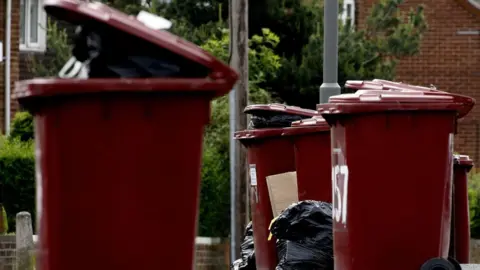 PA
PARubbish collectors might to refuse to empty a bin if it is overflowing.
The number of fines issued for littering - which can include overflowing bins - was more than 140,000 in England and Wales in 2015 to 2016, according to a freedom of information request by civil liberties group, the Manifesto Club.

What about reusable nappies - do they save?
Reusable nappies are typically made from a cloth, such as bamboo, and a fleecy liner, and go in the washing machine.
Abi, who also uses both types of nappies for Alfie, thinks reusing is cheaper overall but can "seem like a lot of work".
"There is extra washing involved - about three loads a week - but this isn't much in the grand scheme of things," she says.
"You don't have to use them every day," she adds. "If we're going out I use disposables, as they don't take up as much space."
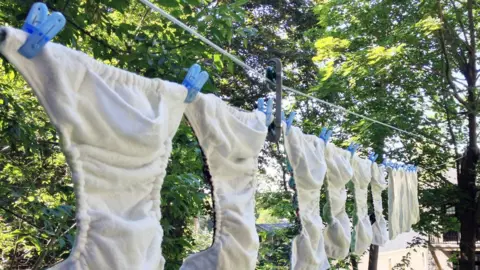 Getty Images
Getty ImagesBut the upfront cost - about £200 for a kit of 20 - can be off-putting.
Wendy says she always wanted to use cloth nappies as "money was tight" when she became a full-time mother.
She says: "I did think - 'oh my goodness, what if I don't use them?' but £300 has lasted me three children."
Prices of reusable nappies vary from about £7 to £30 per nappy.
According to consumer group Which? a basic set of reusable nappies - £80 - is still cheaper than buying a cheap brand of disposable nappies, at £38 for the first few months.
Some councils give away vouchers for reusable nappies, or free trial kits so parents can try different brands - but the giveaways depend on where you live.
"My council in Hampshire did nothing," says Wendy. "It is frustrating".
The Real Nappy campaign has a search tool for parents to find out if they can get free nappies from the council.
